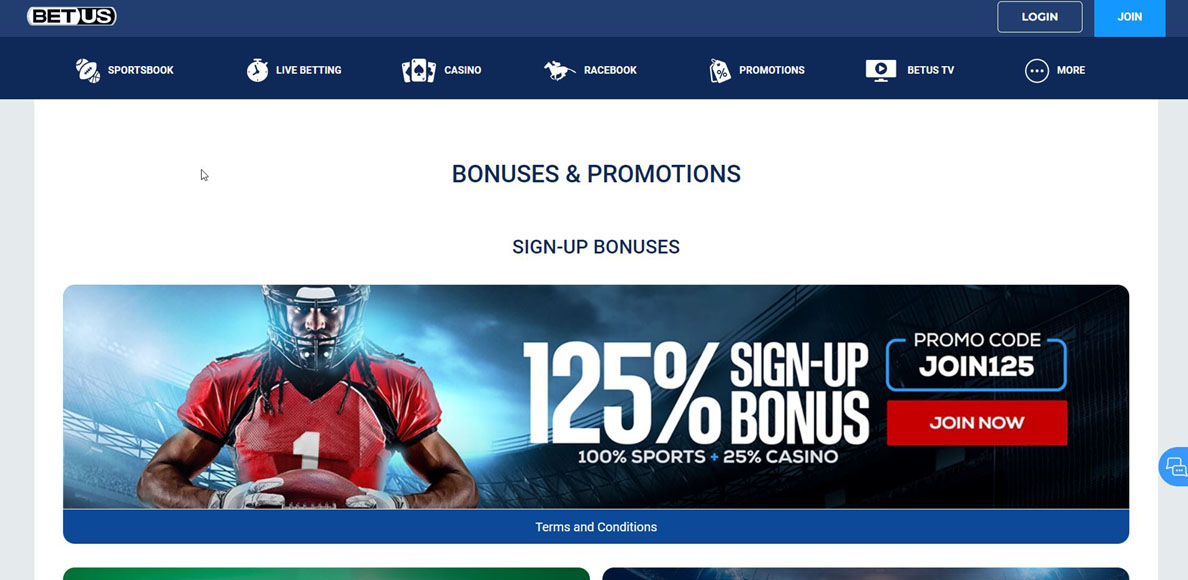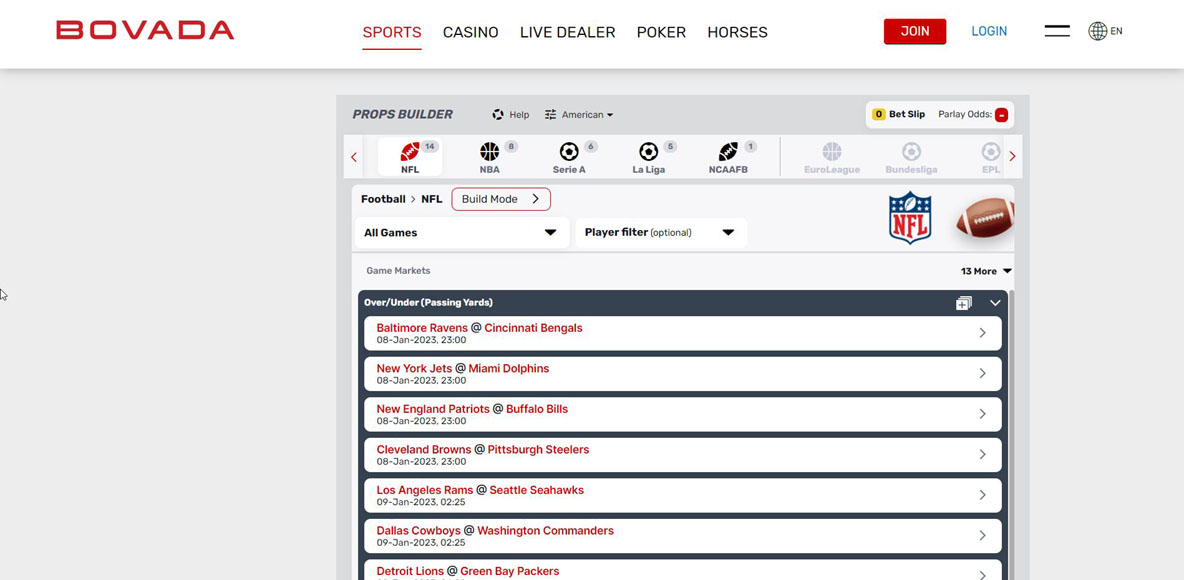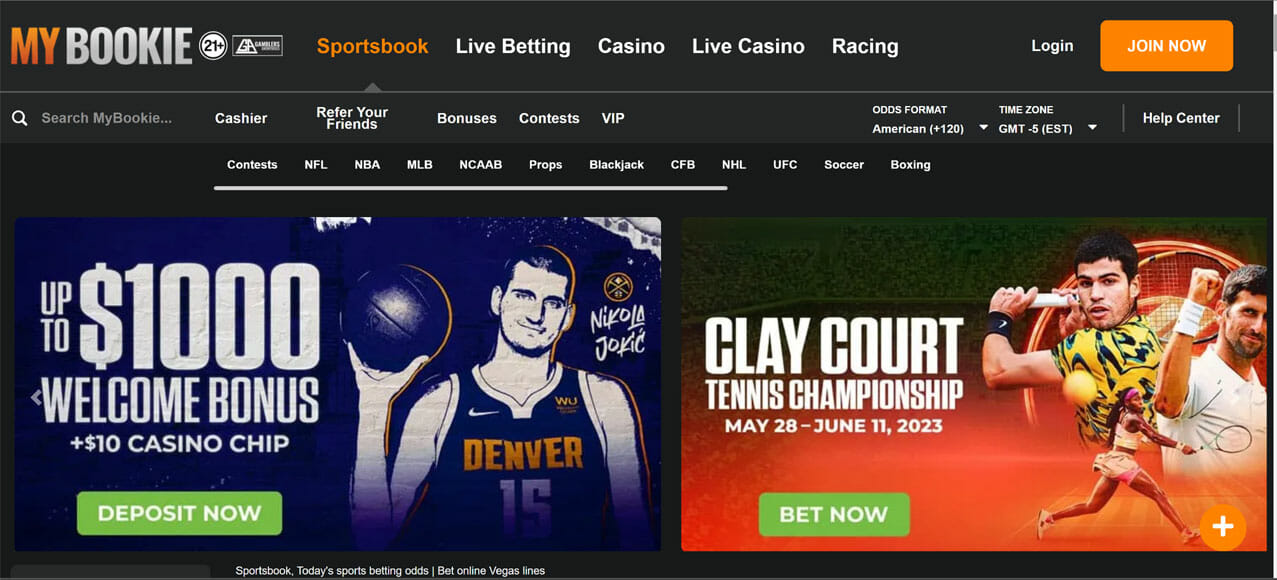

 475
475 22
22Top features:

Top features:
Bonus:
125% up to $3,125 475
475 22
22
 312
312 23
23Top features:

Top features:
Bonus:
50% up to $1,000 312
312 23
23
 112
112 21
21Top features:

Top features:
Bonus:
50% up to $250 112
112 21
21This page includes mini-reviews of Florida’s three most trusted USA online sports betting sites based on the best bonuses and widest market coverage.
BetUS is a renowned sportsbook accepting Florida sports bettors since 1994. Operated by Firepower Trading Limited and licensed by Curacao eGaming, it ensures a secure betting experience.
Florida players are offered significant sports and betting options. You can place bets on professional sports like NFL football and NBA basketball, college sports, and less popular games like soccer and motorsports.
Unique Feature
BetUS also features a VIP loyalty program. You’ll collect loyalty points as you place bets on your favorite sports. The more points you gather, the higher your tier in the six-tier loyalty program, unlocking new rewards such as exclusive bonuses, quicker payouts, and higher deposit limits.

Welcome Bonuses
New Florida bettors can claim a 100% up to $2,500 welcome sports bonus. With a 10x rollover, this bonus requires a $100 minimum deposit. Enable this one-time offer with a JOIN125 code and use the bonus terms within 14 days.
BetUS offers a 200% bonus of up to $5,000 for those who prefer using cryptocurrencies. Use the JOIN200 code to access this exciting offer, which comes with a 15x rollover.
Deposits can be made using three credit and debit cards (Visa, Mastercard, American Express) and bank wire. You can also start wagering in Florida for as low as $10 with various cryptos, including Bitcoin, Bitcoin Cash, and Litecoin.
If you’re looking for the best mobile betting experience in Florida, try Bovada. This Canada-based site was launched in 2011 and is licensed by Curacao Gaming Commission to offer sports betting in Florida.
You can use Bovada’s mobile site on your iOS and Android smartphones, from signing up and placing a sports bet online to cashing out your winnings.
Bovada allows betting on every sport from the Big Four – NFL, NBA, NHL, MLB – to NCAA and other events like politics and entertainment.

Bovada unfolds a 75% up to $750 crypto sports welcome, allowing Florida sports bettors to grab this one-time opportunity when they make their first deposit. Bitcoin, Bitcoin Cash, Bitcoin SV Deposit, Litecoin, and USDT are eligible payment methods. Use bonus code BTCSWB750 and clear the bonus terms with a 5x rollover.
You can have eight deposit options, including major credit cards and cryptos. However, the inclusion of MatchPay makes Bovada the only Florida sports betting site to allow e-wallet banking options. You only need to create a MatchPay account to deposit or withdraw your money using various popular e-wallet options like PayPal.
MyBookie is licensed by Curacao and offers a wide range of sports/leagues to bet on, including American Football (NFL), basketball, baseball, boxing, collegiate sports (NCAA), and more.
MyBookie’s live betting feature has made Florida sports betting easier than ever before. You no longer have to find the right bets. Instead, you can place wagers easily from MyBookie’s main page.

New Florida sports bettors can grab a 50% deposit match up to $1,000 with a 10x rollover requirement.
You can use 13 different deposit options to fund your MyBookie account, including two major credit cards and various cryptocurrencies. However, the only withdrawal options are Bitcoin, bank wire transfer, and eCheck. The best thing about MyBookie’s banking option is the lowest credit card deposit fee (4.9% on Mastercard and 6% on Visa).
| Sportsbook | Welcome bonus | Playthrough | Valid for | Min. deposit |
|---|---|---|---|---|
| BetUS | 100% Up to $2500 | 10x | 14 days | $100 |
| Bovada | 75% up to $750 | 5x | doesn’t expire | $20 |
| MyBookie | 50% Up to $1000 | 10x | 30 days | $50 |
| XBet | 50% Up to $500 | 7x | 15 days | $45 |
It depends on the site you choose. While many offshore sites are not safe, no shady site can exist for long as the word spreads faster than the speed of light.
Luckily, our top Florida sites, like BetOnline, have been secure and operational since 2001. So, we recommend you use our suggested offshore site. BetOnline and Bovada use advanced SSL encryption to secure your financial information. Besides, these sites also offer exciting bonuses and competitive odds.
Florida became one of the largest sports betting markets when its only mobile sportsbook site went live in November 2021, weeks before it shut down operation indefinitely following a court ruling.
An appellate court will decide, possibly in 2023, whether or not legal online sports betting will return to the Sunshine State. However, gambling laws in Florida governing sports betting technically exist.
In May 2021, the state lawmakers approved a gambling expansion deal struck between the Florida governor and the Seminole Tribe of Florida.
Under that gaming compact, the Seminole Tribe was allowed to offer sports betting in the state besides other gambling offerings. The deal included retail and online sports betting and required Seminoles to launch sports betting until Oct. 15, 2021.
In November 2021, the tribe launched online sports betting with the Hard Rock Sportsbook mobile site. But Florida’s only legal sports betting option was shut down within weeks after a federal judge ruled that online betting violated a federal law.
US District Judge Dabney Friedrich called the deal giving the Seminole Tribe exclusive control of online sports betting in Florida a “fiction.”
US District Judge Dabney Friedrick ruled that the renegotiated gaming compact violates the federal Indian Gaming Regulatory Act (IGRA). The act, established in 1988, creates a framework that governs gambling activity on tribal lands. The 25-page ruling centered on mobile bets run through computer servers on tribal land.
“Altogether, over a dozen provisions in IGRA regulate gaming on ‘Indian lands,’ and none regulate gaming in another location,” Friedrich wrote in her ruling. “It is equally clear that the secretary must reject compacts that violate IGRA’s terms.”
Friedrich wrote that the compact deems sports wagering to occur at the location of the tribe’s servers, adding that “this court cannot accept that fiction.”
She further wrote, “When a federal statute authorizes an activity only at specific locations, parties may not evade that limitation by ‘deeming’ their activity to occur where it…does not.”
In the Florida sports betting case, a yes or no to this answer would be an oversimplification.
Floridians enjoyed legal online sports betting for less than five weeks when the Hard Rock Online Sportsbook – the state’s only legal betting option – announced it would be “temporarily suspending” all sports betting activity on Dec. 4, 2021. It came nearly two weeks after the judge ruled the Florida-Seminole Gaming Compact violated the Indian Gaming Regulatory Act.
While the local stakeholders continue their battle to legalize Florida sports betting market, the good news is that residents can still enjoy premium online wagering at offshore sportsbooks.
No, retail betting is not legal in Florida after the federal court’s ruling vacated the compact that legalized sports betting in the state. Several retail sportsbooks will be available at Florida’s tribal casinos owned by Seminoles once their gaming compact is reinstated.
Some Florida lawmakers were keen to legalize sports betting in the state following the annulment of the PASPA in May 2018. However, one factor was potentially affecting exclusive legal discretion: Amendment 3. In November 2018, Florida voters approved Amendment 3, which states that any gambling expansion would require voters’ approval.
Gov. Ron DeSantis and the Seminole Tribe of Florida successfully renewed a tribal-state gaming compact in April 2021. The compact came two years after the failure of the previous deal led the Seminoles to announce they would not make the annual payment of nearly $330 million to the state in 2020.
Under the 30-year deal signed by DeSantis and Seminole Tribe of Florida Chairman Marcellus Osceola Jr, and ratified by the Florida legislature in May 2021, Seminoles agreed to pay the state roughly $2.5 billion over the first five years in exchange for gambling expansion, including exclusive sports betting at their tribal casinos.
The “hub-and-spoke” sports betting plan was designed to enable Florida online sports bettors anywhere in the state to place wagers with mobile applications or other devices.
In August 2021, the owners of Magic City Casino in Miami-Dade County and Bonita Springs Poker Room in Southwest Florida sought a judge to overturn the federal approval of the tribal gaming compact, alleging that the compact is unlawful. According to the law, Class III gaming – including sports wagering – can only occur in the participating tribe’s sovereign territory.
While the Seminole Tribe continues its legal battle to legitimize its 2021 compact to regulate sports betting in the nation’s third most populous state, legal Florida sports betting may not come any time soon.
FanDuel and DraftKings have also failed to bring up the question of legal sports betting in the state on November 2022. Both operators admitted in January 2022 that they lacked the required signatures to make it on the 2022 ballot.
While Florida sports betting remains unregulated as of January 2023, you don’t have to wait for legal sports betting. You can place online bets using the top offshore sportsbooks like BetOnline that accept players from Florida.
Meanwhile, all the leading offshore sportsbooks feature the following promotions and bonuses to their Florida customers.
A risk-free bet allows players to get a refund for their initial bet if it loses. This kind of bet is usually capped at a certain amount.
A deposit match is one of the most common promotions on every major FL sportsbook site. For instance, BetOnline’s 50% up to $1,000 is the best sports welcome bonus in Sunshine State.
Leading Florida sites find pretexts to reward their regular players. A referral bonus is one of those rewards. For instance, Bovada allows Florida players a 200% referral match bonus up to $200. In addition, you can grab an extra $75 bonus if referrals make the first deposit with one of the cryptocurrencies.
Top sportsbooks offer their players increased odds on a certain bet, allowing them to get better odds than usual. Giant operators provide the best odds boosts by sacrificing the house edge. For example, BetOnline’s Odds Booster offers the best odds boost promotion in Florida.
If you win all the legs in a parlay bet except one, your sportsbook will return your initial wager. This promotion aims to encourage Florida bettors to participate in parlay betting. Usually, a player must win all legs to cash out the winnings.
A no-deposit bonus allows bettors to place certain wagers without even making any deposit when joining a new Florida site. Currently, none of our top three Florida sports betting sites provide a no-deposit bonus.
Check out our guide to the top no-deposit bonuses in Florida.
Considering the ever-increasing mobile betting trend, all our top-rated Florida sites are 100% mobile-friendly. For example, Bovada and BetOnline allow you to use their premium wagering platforms directly through your iOS and Android browsers. Everything from creating your account on mobile to making mobile bets and cashing out is super-easy using our top Florida online betting sites.
Check out our overview of the top Florida mobile betting apps.
Experience, reliability, best bonuses, and market coverage are advantages of offshore sportsbooks in Florida. For instance, BetOnline went online two decades before Florida’s only legal sportsbook site went live in 2021. However, unlike that legal sports betting application that went down within five weeks of launch, the top offshore sportsbooks have continued operations incessantly.
With three NFL teams, Florida joins the national craze of NFL betting. Every NFL season witnesses a significant amount of betting, from the preseason to the Super Bowl. Florida sports bettors become a part of the crazy football season, thanks to Bovada – the best online betting site for NFL betting.
Bovada provides the most competitive odds on NFL betting, allowing an array of betting options from simple moneyline betting to a more sophisticated NFL props builder.
Hard Rock Sportsbook was the newest sportsbook site in Florida when it began a short-lived legal Florida sports betting operation in November 2021. That said, MyBookie is one of the newer online sites in Florida available since 2014. XBet, another leading FL site on our top 10 list, was launched in 2013.
Horse racing and horse race betting are legal in Florida, and the Florida Division of Pari-Mutuel Wagering oversees the related activities. Gulfstream Park, Hialeah Park, Isle Casino Pompano Park, and Tampa Bay Downs are the most popular tracks in the Sunshine State.
Florida horse racing fans can place online bets using all our top Florida sports betting sites. BetOnline and Bovada are full-service gambling sites, including full-scale racebooks.
You can also participate in election betting using our top Florida sportsbooks. Bovada is our top recommendation if you’re looking for the best odds on US politics, particularly US Presidential Election 2024. BetOnline is an ideal option if you want to bet on global politics, like French Presidential Election or EU Elections.
The following bet types are common across all the leading Florida sports betting sites:
Moneyline: Moneyline is the simplest bet type with mostly two (sometimes three) outcomes. When two players or teams are playing, you must choose one player or team to win.
Parlays: In parlays, two or more bets are tied together on the same ticket to create a larger bet. Each individual wager in parlay bets is called a ‘leg.’ You must win all legs to win the whole parlay.
Totals: A total betting – also called over/under – is a wager on the total number of points/scores/goals in a game. You have to bet on whether or not the combined points scored by both teams will go over or under an amount set by your Florida online betting site before the event.
Points Spread: In points spread, a team must win by a specific point/number/goals or must not lose by a specific point. This form of betting is mostly involved when a favorite and an underdog are playing. The purpose is to create an opportunity to bet money on teams in a contest by assessing their relative strength against each other.
Futures: Florida bettors can also place futures bets on an event – series, award, or election – whose outcome will determine in the future. For instance, ‘who will win the next Super Bowl’ or ‘who will win the 2024 US Presidential Election’?
Prop Bets: A prop bet – short for proposition bet – is a wager not directly related to the outcome of an event. For instance, you can bet on how a certain player will perform or which MLB team will hit a home run first.
Live Bets: Live betting – or in-play betting – allows you to bet on an event that is already underway. In contrast to placing bets before the game begins, live betting lets you to take advantage of live odds while watching your favorite sport.
Prohibited Bets: Using our top Florida sportsbook sites, you can even participate in prohibited bets like election betting.
When choosing the best Florida sportsbook site, you must look for all the following points:
Reviews: Independent reviews will reveal whether or not a Florida site is worth joining. Instead of sticking to any single reviewing site, read as many reviews as possible. Also, complement your research by reading customers’ reviews.
Licensing Information: Always make sure the Florida site you want to join is licensed by a recognized regulatory body. For instance, Panama Gambling Commission and Curacao Gambling Commission are some of the most prominent jurisdictions.
Promotions: Promotions increase your bankroll with free bonus money. But a Florida sports betting site’s ability to offer attractive bonuses also means the site has financial stability.
Accessibility: Only join a Florida online sportsbook accessible to you everywhere in the state. Of course, that is only possible if the site is compatible with all kinds of mobile users (iOS and Android).
Bets Allowed: The bigger Florida sportsbooks allow multiple ways to place online bets. Moneyline, totals, parlays, point spread, futures, and live betting are some major bet types to look for.
Odds Pricing: Before signing up with a Florida sportsbook, you must shop for odds pricing – comparing the best odds. For instance, if a site offers -110 and the other -120, it means the site offering -110 provides better odds.
Deposit and Withdrawal Options: The more banking options a Florida sports betting site offer, the better. It would be nightmarish to join a site to see limited banking options, particularly for withdrawing your winnings.
Customer Support: Customer support is one of the most important things to look for when joining a Florida site. Email, phone, and live chat are the major customer support options.
You can bet on professional and college sports in Florida. The Sunshine State is home to three NFL teams (Tampa Bay Buccaneers, Miami Dolphins, Jacksonville Jaguars), two NBA teams (Miami Heat, Orlando Magic), two MLB teams (Miami Marlins, Tampa Bay Rays), and two NHL teams (Florida Panthers, Tampa Bay Lightning).
Currently, there are no legal Florida sportsbooks. If Florida sports betting clears legal hurdles and becomes available, the Seminole tribe will have exclusive sports betting in exchange for sharing a 13.75% of sports betting revenue with the state.
All these major banking options are available on our top-rated Florida online sportsbook:
Credit card deposits are available across all the major Florida online betting sites, including our top three. You can use Visa, Mastercard, AMEX, and Discover using deposits and withdrawals on BetOnline. However, credit cards come with higher deposit fees.
You can also use bank transfers for deposits and withdrawals on our recommended Florida online sportsbooks. However, before joining the FL sportsbook, you should compare the minimum deposit and maximum withdrawal limits.
Although offshore sportsbooks don’t extend e-wallet options to US-based customers, you can still use popular e-wallet banking options using Bovada. You must create a MatchPay account and connect it with one of the e-wallet options like PayPal, Venmo, Zelle, and more.
Bitcoin is the most popular banking option every Florida sportsbook will offer. Top operators like BetOnline and Bovada encourage Florida players to use Bitcoin, offering boosted offers and the fastest payments on the top digital cryptocurrency.
Besides Bitcoin, our top Florida sportsbook sites allow dozens of other cryptocurrencies called altcoins. With 17 altcoin deposits and withdrawals, BetOnline is one of the best altcoin online sportsbooks.
Florida is home to eight professional sports teams and many popular college teams. Each of those has a huge fanbase:
Yes and no. Florida sports betting was legally available for nearly a month between November and December 2021 before a judge put it on hold. The final decision is still pending with an appeals court. Florida online casinos and FL poker sites remain illegal and were not legalized under the 2021 bill.
While there are no legal FL sportsbook mobile sites, leading offshore operators like BetOnline accept Florida players aged 18 or above.
Florida online sports betting became legal in May 2021 after Gov. DeSantis signed gambling expansion, allowing Seminole Tribe exclusive online sports betting.
Yes, all our recommended offshore sites dish out significant bonuses for new and regular players in Florida.
Currently, no agency regulates online sports betting in Florida. However, the Florida Gaming Control Commission will regulate online sports betting in a regulated market.
You can be a resident or visit Florida to place online bets via offshore sportsbooks.
While daily fantasy sports remain in legal grey areas in Florida, you can participate in DFS contests using DraftKings and FanDuel.
All our recommended Florida sites are perfectly safe for online sports betting. For instance, BetOnline and Bovada use advanced SSL encryption to secure your data online.
Although DraftKings cannot legally accept online bets in Florida, it runs daily fantasy sports operations in the state.
FanDuel also runs DFS operations in the unregulated market in Florida.
Curacao licenses Bovada to operate legally in the US online sports betting, including Florida.
BetOnline has been legally available to Florida sports bettors since 2001.
MyBookie runs legal operations in Florida, thanks to its Curacao license.
BetUS was launched in 1994 and operates on a Curacao license to take online bets in Florida.
Are you ready to take your online gambling experience to the next level? Sign up for the LetsGambleUSA newsletter and get the latest news, exclusive offers, and expert tips delivered straight to your inbox.